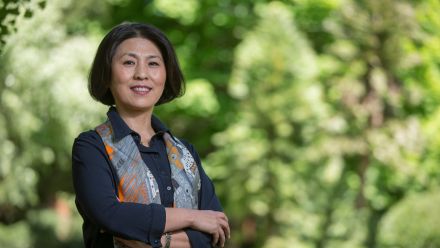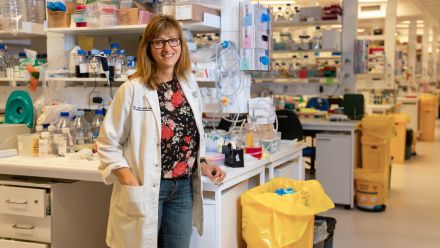At the leading edge of brain cancer research
With the right infrastructure and personnel, we can take newer, more effective drugs to trial within a year or two
Cancer is the number one cause of death in the developed world. Survival rates for many types of cancer have improved significantly over the last 20 years. However, the five-year survival rate for invasive brain cancer treatment remains at just around five per cent.
Professor Leonie Quinn is hoping to change this.
New hope from a new approach
"Brain cancer treatments haven't improved in 30 years," says Professor Quinn, who leads the Quinn Group of Cancer Models in the John Curtin School of Medical Research at ANU. "And there's no one drug that can cure brain cancer. We need multiple drugs and a sophisticated understanding of the biology of the cancer itself, in its micro-environment.'
Using 3D bio-printing, Professor Quinn aims to build 'mini-brains' closely replicating the environment of tumours in the human brain. This cutting-edge model will enable the screening of multiple new drug therapies against the 3D mini-brain. This can fast-track them to clinical trial and in turn, enable a higher success rate of the treatments.
Professor Quinn already has an agreement with a leading cancer clinical trial centre in the USA to immediately progress therapies shown to be successful in the 3D mini-brains to clinical trial.
"This is the hope we have for brain cancer treatment. The current clinical trials repurpose old drugs without understanding the complex biology of brain cancer. It's like throwing things at a problem in the dark, hoping you'll find the solution."
Right people on the right platform
Creating this globally unique screening facility will need building and combining new bespoke microscopes, robotics and bio-printing technology. Also essential to its success are research clinicians with the relevant experience.
"Receiving the right support can help this research break new ground," says Professor Quinn. "With the right infrastructure and personnel, we can take newer, more effective drugs to trial within a year or two. And with higher success rates."
Professor Quinn believes supporting the research will also ensure the next generation of leading scientists, as the quality of the training received is of the highest level.
"Our research is training people who will fuel industry, government and science communication. And we do all of this while maintaining the highest ethical standards in our work."


